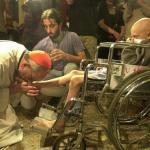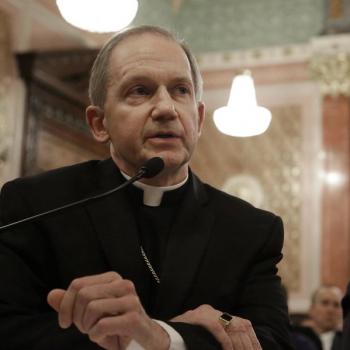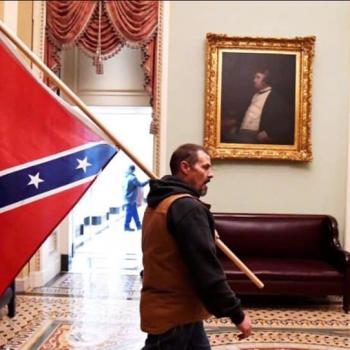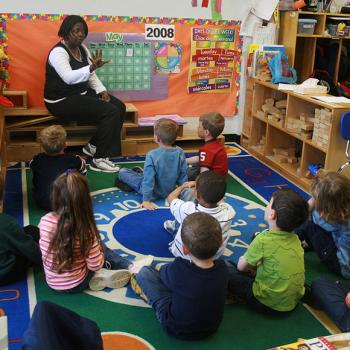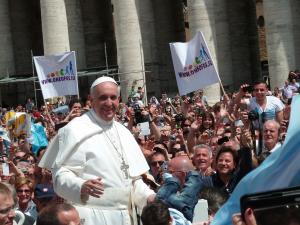
Pope Francis and President Donald Trump do not have much in common, but one characteristic they share is that they seem to bring out the worst in some people. And they do it just by being themselves.
With Mr. Trump, it’s his ability to get racists to out themselves. They feel comfortable with him, and he with them.
With Pope Francis, it’s his ability to get some Catholics to reveal their hostility to him—and by extension their hostility to the fullness of the faith to which the Pope bears witness, as opposed to the watered-down, Americanist version of it. The result is the extraordinary lengths to which they will go to besmirch his good name and engender hate for him.
Case in point, Simcha Fisher.
Ms. Fisher wrote a piece last Friday in which she accuses the Pope of sounding like an abuser. Ms. Fisher does not herself directly say that about the Pope. She instead relies on anonymous sources:
I have a number of friends who have escaped abusive marriages. They tell me that Pope Francis is sounding more and more like the men who abused them. He’s sounding like the men who hid that abuse from the world, who taught their victims to blame themselves, who used spiritual pressure to persuade them and their families that it would actually be wrong, sinful, to defend themselves.
As you can see, Ms. Fisher lets others do her dirty work, exploiting them and their suffering for clickbait—while at the same time giving herself plausible deniability if she’s called out on it.
She opens her essay by assuring us that she is being charitable: “Shall I tell you the most charitable, least rash explanation I can muster for Pope Francis’ recent words and behaviour?” she asks. “It’s that he’s surrounded himself with yes men who are shielding him from understanding the depth and breadth of institutional sex abuse and its cover-up in the Church.”
Is “charitable” the right word to describe what is clearly an insult?
Ms. Fisher offers no evidence for how she knows the Pope’s advisors “tell him that the world is chock full of false accusations, that the scandal thing is overblown, that it’s all in our past.” She just says it. She also offers no evidence—even if his advisors are saying this—that the Pope accepts what they’re saying.
Instead, Ms. Fisher tries to supply evidence in the form of links to five different websites, but here is where her argument, such as it is, crumbles. She writes:
After responding to a question about Vigano’s very serious accusations, [the Pope] said point blank, “I will not say a single word on this.”
“Vigano” (sic) is Archbishop Carlo Maria Viganò, former papal nuncio to the United States. And the article Ms. Fisher links to is about Pope Francis’ reaction to an eleven-page screed from Archbishop Viganò in which he falsely accused Pope Francis of lifting “secret sanctions” allegedly imposed on Archbishop Theodore McCarrick by then-Pope Benedict, and of actively covering up Archbishop McCarrick’s history of sexual abuse of seminarians and minors.
The story of Archbishop Viganò’s letter broke Saturday, August 25. Pope Francis flew home from an apostolic visit to Ireland the following day and as usual answered questions from reporters. “I will not say a single word on this” was his response when asked about the letter—not the sex abuse crisis. His full response, as reported in Ms. Fisher’s first link, was:
“I read the statement this morning, and I must tell you sincerely that, I must say this, to you and all those who are interested: Read the statement carefully and make your own judgment,” he answered. “I will not say a single word on this.”
Speaking aboard the papal plane from Dublin to Rome Aug. 26, Francis said he believes in the “journalistic capacity to draw your own conclusions,” calling it an “act of faith.”
“When some time passes and you have drawn your conclusions, I may speak. But I would like your professional maturity to do the work for you. It will be good for you,” he told members of the press.
Ms. Fisher is conflating Pope Francis’ self-imposed silence regarding false allegations made by a disgruntled former employee (Viganò was sacked by Pope Francis for inserting himself in domestic American political conflicts) with Pope Francis’ separate reaction to the shocking Pennsylvania Grand Jury report released earlier in August—a report that detailed decades of systematic sexual abuse of minors and subsequent cover-ups.
And about that abuse, Pope Francis was anything but silent.
What Ms. Fisher is up to here—and in her other four links—is a bait-and-switch, a con job. A con job with the objective being, of all things, to accuse the Holy Father of exhibiting the characteristics of an abuser.
Let’s look at the rest of those links. The second is about a homily Pope Francis gave September 3 in which, in a reflection on the Gospel of Luke, he talked about silence in the face of false allegations. The third link is the same story as the second, only on a different website (sloppy editing there, Ms. Fisher). In the fourth link, Pope Francis does not, as Ms. Fisher claims, say it’s “‘ugly’ to accuse others of sinning.” No, the Pope calls it “an ugly sign” when people become “accustomed to accusing others, to talking about others, to being nosy about the lives of others.” Finally, the fifth link is to a story on the Pope’s September 5 general audience talk, which was a reflection on the Third Commandment.
None of these articles has anything to with the sex abuse crisis. All can be seen as further reflections from the Pope as to why he will not respond to Archbishop Viganò’s pack of lies (which had, anyway, fallen a part in less than a week. By August 31, what Archbishop Viganò originally called official “sanctions” imposed by Pope Benedict on Archbishop McCarrick had been downgraded to “no formal decree, just a private request.”).
But Ms. Fisher presses on, literally putting words in the Pontiff’s mouth:
To the victims of the Church, and to those who love them, it sounds like he is saying, “Who do you think you are? I don’t have to explain myself to you. You’re the guilty one. You brought this on yourself. If you want to be loved, then know your place. I’m the victim, here, not you. If you know what’s good for you, keep your mouth shut.”
Ms. Fisher lacks the integrity to accuse the Pope directly. Instead, she hides behind desperate repetitions of the idea that she’s not really saying he does bad things, it’s just that her friends think that he kind of sounds like the sort of person who does bad things: “maybe he simply doesn’t realize,” and “he’s coming off as” and “he (or it) sounds like.” This gives her the luxury of avoiding openly stating ideas that she is, nevertheless, pushing throughout the article.
As a friend of mine remarked after reading the piece, “Failing to own openly something that you are nevertheless clearly intending to suggest is the hallmark of passive aggression. To accuse is to confess: this whole essay is a masterclass in passive aggression. And it’s not the Pope’s.”
It also is, I might add, how gaslighting abusers talk.
The truth is, Pope Francis has addressed the sex abuse crisis. He correctly blamed clericalism and the abuse of power in his reaction to the Pennsylvania report. He spoke about the abuse crisis on his recent trip to Ireland and met with abuse victims there. This Newsweek article details Pope Francis’ history of addressing the crisis and meeting with victims. It also lists the Pope’s one slip-up—and his subsequent effort to rectify his error.
And in case no one noticed, Pope Francis is the only Church official on record to impose actual sanctions on Archbishop McCarrick, ordering him removed from all public life and ministry, and demanding his resignation from the College of Cardinals.
Ms. Fisher’s article is a nasty bit of backstabbing. If anything, it should have been directed not at the Holy Father, but at Archbishop Viganò, whose well-timed accusation did its job of shifting attention away from Pennsylvania report and the U.S. bishops, whose cover-ups allowed those crimes to continue for decades. Instead, she shifted blame to an innocent man who has done and said more than any other Pope to discipline bishops and priests, to comfort victims, and to protect children.
The priest sex abuse crisis is a worldwide problem. However, victims in Pennsylvania and other states, and powerful predators such as Archbishop McCarrick, are an American problem. And it is American prelates who did nothing, shirking their duty for decades. To the extent that people ranging from Simcha Fisher up to Archbishop Viganò shift blame to Pope Francis—thus covering for the American hierarchy—they are part of the problem.
(The final paragraph was edited slightly for clarity. -SPD)


